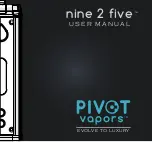
5-23
ASDI Operations and Maintenance – TX Models – P/N: 52368
Annual Maintenance Requirements:
Component
Action Required
Inlet strainer
Remove plug and clean the screen. Replace screen if gaps or holes are present
in the screen. If oils or contaminants are present, it may be necessary to use a
cleaner to remove them.
Inlet solenoid valve
Change solenoid valve diaphragm and internal component using recommended
repair kit for the inlet solenoid valve (see spare parts list for proper part number).
Refer to the maintenance and operation information for ASCO 2 way valves
included in the Appendix section. Replace solenoid valve if the valve body is
damaged. NOTE: Install kit if the valve makes unusual noise (chatter or
buzzing) during normal operation.
Liqui-SAFE
TM
valve
Conduct performance check as described on page 5-25.
If valve does not pass
leak test, replace all O-rings in the Liqui-SAFE
TM
valve provided in the repair kit.
If valve does not latch test, replace Liqui-SAFE
TM
valve assembly. (see spare
parts list for proper part numbers).
Contactor
Follow the contactor inspection schedule as described in the
Contactor
Inspection
section. Inspect the contactor for any discoloration, warping, melting,
or pitting. These are indications of excessive heat or excessive wear. If these
indicators exist, replace the contactor before returning the vaporizer to operation.
If contactor operation is noisy (humming), replace the contactor.
Relief Valve
Visually check and replace in leaks are observed. Check for excessive corrosion
and ensure the relief valve is covered with the appropriate rain cap to prevent
rain and debris from entering the valve. Replace rain cap if not present or
damaged. Relief valve should be replaced per the manufacturers’ recommended
replacement date or if it relieves during normal operation.
Electronic wiring and
connections
Check primary terminal lug tension and visually inspect all electrical connections
for corrosion, loose wires, heat build-up and/or charring. Tighten or replace if
necessary.
Heat exchanger &
system drip legs
Check the system drip legs and vaporizer for heavy ends and oil build-ups. If
present, first ensure there are no sources of ignition within 25 feet, then drain
heavy ends. NOTE: In areas where LPG quality is poor it may be necessary for
the drip legs and heat exchanger to be checked for heavy ends more frequently
(monthly or bi-monthly depending on quality of LPG). Once it is verified that no
significant quantity of heavy ends are accumulating during vaporizer operation,
this maintenance can be performed on an annual basis.
Summary of Contents for TORREXX TX100
Page 8: ......
Page 56: ...APPENDIX A TECHNICAL INFORMATION ...
Page 65: ......
Page 66: ......
Page 67: ......
Page 68: ......
Page 69: ......
Page 70: ......
Page 71: ......
Page 72: ......
Page 73: ......
Page 74: ......
Page 83: ...ASCO Valve used by Algas SDI ...
Page 86: ...ASCO Valve used by Algas SDI ...
Page 87: ......
Page 88: ......
Page 89: ......
Page 90: ......

































